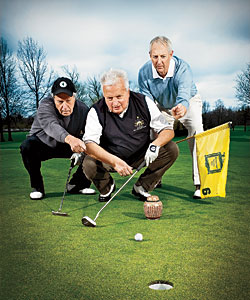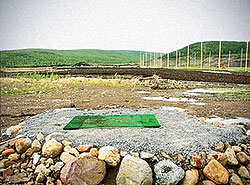
Drivers needed: (from left) Jim Thompson, Vic Zast, and Dan Johnson—with their late pal Mike Allen (in urn)—gear up for tee time in the Arctic Circle.
Say you’re about 65 years old, more or less retired, and looking for something to do with your buddies.
Something special.
Something that involves golf.
And let’s say one of your buddies is dead, but you don’t want to leave him out.
Well, then you’d probably come up with the exact same plan as Vic Zast. You and your buddies would rent an RV, pack up your dead friend’s ashes, and drive 4,314 miles in 16 days across three time zones, seven states, two Canadian provinces, and two territories—the last 500 miles on a tire-chewing gravel road—to play three holes of golf in the Arctic Circle.
And you’d plan it so that you reached your destination—a town called Inuvik—in time to tee off at midnight on the summer solstice.
Related:
MORE COLUMNS BY EIG
The Bulls’ Secret Weapon: Tom Thibodeau »
Chicago Baseball Preview: The Most Dismal Season in 30 Years? »
Doak Ewing, Vintage Sports Film Collector »
Lovie Smith on Keeping His Cool »
Can Theo Epstein Deliver for the Cubs? »
Rosemont-based Riddell Seeks to Build a Safer Football Helmet »
Adam Greenberg Dreams of Making It Back to the Majors »
For the Chicago Comets, Blindness Is No Impediment to Tough Competition »
Six Decades After His White Sox Debut, Minnie Miñoso Still a Fan Favorite »
Laurie Schiller, the Most Successful College Coach You've Never Heard Of »
It’s obvious, isn’t it?
A couple of years ago, when he was recuperating from open-heart surgery, Vic read a book called Await Your Reply, by Dan Chaon. The book is grim. It opens with a guy freezing in a car, his severed hand in a Styrofoam cooler by his side. But for reasons Vic can’t explain, it convinced him that he needed to see the Arctic Circle.
It might have had something to do with the fact that he was lying in a hospital bed, confronting his mortality, and suddenly felt the desire to go to a place where for one day a year the sun never sets. Or, as Vic says, “it might have been the painkillers.”
Either way, he couldn’t shake the idea. And though he looks like a harmless guy, with his spiky white hair and gentle grin, when Vic gets a notion like this in his head, he’s dangerous.
He knew such a journey would not be easy. For one thing, he’s lousy with directions. Also, he’s the kind of guy who would rather hold it in for 4,314 miles than go to the bathroom in the woods. But Vic believed he could make it work, somehow, if he could convince his two best friends to come along.
His buddies humored him. Sure, Vic, they said, whatever you want. After all, the guy was recovering from open-heart surgery. No point in getting him upset.
“I thought I’d say yes and hope that it goes away,” says Dan Johnson, a 64-year-old retired accountant who lives in Highland Park.
“I thought it was a joke,” says Jim Thompson, 66, a retired ad executive from Leo Burnett who lives in Lincoln Park.
They figured Vic would sober up and do the math. They figured he would realize that 4,314 miles is roughly the distance from here to Sweden and that at an average speed of 50 miles an hour—a highly optimistic estimate—they’d have to spend 86 hours on the road. They figured the cost of the project—$8,500 for the RV and about $3,500 more for fuel—would stop him.
If nothing else, they figured, he’d come to realize that the Arctic Circle does not have a lot of public restrooms.
They figured wrong.
Their 24-foot RV—stocked with Myers’s rum, Temptations CDs, and an urn full of ashes—pulls out of Chicago on June 5th.
* * *

Plenty of rough and a portable green: the golf course at Inuvik, 4,314 miles northwest of Chicago
The ashes are those of Mike Allen, who died two years ago at the age of 64. On the day I interviewed the less-than-fearless travelers, Vic brought the ashes. The urn was in a Nordstrom bag.
“This is Mike,” he said by way of introduction.
“Nice to meet you, Mike,” I said, nodding at the urn.
His ashes are on loan from Mike’s ex-wife. Vic, Dan, and Jim promised to bring him back from the Artic safe and sound. At least he won’t be cold.
It was Mike, a director on the McDonald’s account at Burnett, who brought this foursome together more than 30 years ago at Westmoreland Country Club in Wilmette. By nature, he was not as gregarious as the others. He tried to make up for it by telling wild stories of exploits that, in many cases, almost certainly never happened. He wanted everyone to be happy. He wanted this four-way friendship to stay strong. He said things guys are not supposed to say to one another. When his marriage of 30 years ended, he told his buddies how much they meant to him. He said he loved them.
Related:
MORE COLUMNS BY EIG
The Bulls’ Secret Weapon: Tom Thibodeau »
Chicago Baseball Preview: The Most Dismal Season in 30 Years? »
Doak Ewing, Vintage Sports Film Collector »
Lovie Smith on Keeping His Cool »
Can Theo Epstein Deliver for the Cubs? »
Rosemont-based Riddell Seeks to Build a Safer Football Helmet »
Adam Greenberg Dreams of Making It Back to the Majors »
For the Chicago Comets, Blindness Is No Impediment to Tough Competition »
Six Decades After His White Sox Debut, Minnie Miñoso Still a Fan Favorite »
Laurie Schiller, the Most Successful College Coach You've Never Heard Of »
Mike suffered from type 1 diabetes, and he didn’t manage the illness well. His Porsche looked like a baked potato, more dents than smooth surfaces, a result of frequent collisions caused by its driver’s low blood-sugar levels. With Mike, everything was an adventure—even a round of golf.
“The joke was always ‘Hit the ball, drag Mike,’” Jim says.
It was usually around the third or fourth hole that Mike would start to slow down. By the fifth or sixth hole, he might stagger. By the seventh, all too often, he would be face-down in a sand trap. Sometimes they would call an ambulance. Usually, though, they’d prop him in the golf cart and wait for him to come around. He’d regain consciousness at the turn, chug some orange juice, and light a big cigar.
“He’d put you through hell,” Jim recalls, “but then he’d come out of it and say, ‘Hey—’”
Dan finishes his sentence: “‘Where’s the tenth tee?’”
No doubt about it, the men say, Mike would have been the first one onboard for the journey to Inuvik and a golf course called Road’s End. He would have been the one hopping out of the RV to shoo caribou out of the way. He might have triggered some kind of international incident, but he also would have made the odometer click a little faster.
He’ll be missed. But, still, this is not the Mike Allen Memorial Tour. This is a road trip. A buddy movie. Three guys squeezing some extra juice out of life.
“It was the romance of the journey that started it all,” says Vic, who waxes poetic while the others calculate fuel costs. “It’s the journey of life. You don’t just sit back and let others do things.”
Vic promises his companions wonders and glory. He tells them that when they get to Inuvik, if they turn to the east, the next big road is in Europe. He tells them of the grocer they’ll meet near Watson Lake who recently won millions in the national lottery. He tells them about the woman in Johnson’s Crossing who makes cinnamon buns big as pizza pies.
“You gotta have one of those cinnamon buns, right?” he asks.
He tells them about the golf course. There’s no grass, just dust—or ice, depending on the season—so golfers schlep the artificial greens from hole to hole. Ravens sometimes swoop down to steal the balls. That’s the bad news. The good news is that the course is so short they might all shoot par. That would be a first.
Jim and Dan are nodding as Vic speaks, glazed expressions on their faces.
Jim’s girlfriend and Dan’s wife have pointed out that this trip will wind up costing as much as a first-class European vacation—a vacation that the women would have been more than willing to take. The men will be in serious debt to the women when they return, and it’s a debt not likely to be repaid by bringing home pizza-size cinnamon buns.
The men have other concerns, too. Dan is a guy who likes to have a crease pressed in his jeans. Jim plays piano. Vic used to run a perfume company. They’re not exactly candidates for Survivor. None of these guys has ever changed an RV tire before, and no one is too excited about the prospect.
Then there’s the issue of wildlife. What do they do if a herd of bison blocks the road or a grizzly gets a whiff of their pizza crusts and starts rocking the RV? Would it be wise to bring a weapon? Is it legal to bring a weapon? Would anyone know what to do with a weapon?
Finally, there’s one more thing nobody likes to think about: the return trip. Driving 4,300 miles is one thing. But 8,600? Not even Vic is up for that.
* * *
The men will be followed on their journey by a documentary film crew (they’ve also got a terrific website at ourlongestdrive.com). They’re trying to convince the crew to take the RV and return without them so that they can fly back from Whitehorse, the biggest city in the Yukon. At presstime, the issue was unresolved.
Vic, characteristically, says it will work out in the end.
When I ask him where this gung ho spirit comes from, he puffs his chest and tells me his full name is Victor Edward Zast. The nurses at the hospital in Buffalo gave him that name because he was the first baby born after President Truman declared the end of World War II on May 8, 1945—Victory in Europe Day. VE Day. Victor Edward Day.
Whenever he faced a challenge as a child, his mother would tell him, “Your name is Victor Edward. You were the first baby born after the war.” He says, “I think that gave me the supreme confidence I carry around with me.”
“That’s amazing,” I say.
I look over at Jim and Dan, who are listening attentively to this story. “Have you guys heard this before?”
They roll their eyes and sigh in unison. Only a hundred times, their expressions say.
Ah, but what are friends for?
Happy trails, gentlemen.
Photography: Anna Knott


